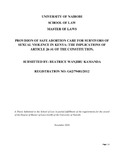| dc.description.abstract | The Constitution of Kenya 2010 under Article 26 (4) prohibits the procurement of abortions in Kenya. However, the provision introduces more exceptions when a safe abortion may be procured. While the Penal Code1 provided for one exception when an abortion would be legally procured that is, when the life of the mother was in danger, Article 26 (4) of the Constitution provides for three exceptions. Under the provision an abortion may be procured legally, first “where there is need for emergency treatment”, secondly “where the health of the mother is in danger” and thirdly “where the life of the mother is in danger.” Additionally, the subsection also gives room for safe abortions to be procured under any other circumstances “if permitted by any written law.”
This thesis investigates the implications of article 26 (4) to survivors of sexual violence in light of various rights such as the right to health and the right to be free from torture under the Constitution, regional and international instruments.
It is the argument of this thesis that there is inadequate legislation to give effect to article 26 (4) this is especially so because the Penal Code for example is yet to be amended to reflect the extended exceptions as provided for under the Constitution. Additionally, the Reproductive health Bill, 2015 fails to give effect to article 26 (4) as it does not give clarity for example on what qualifies as a threat to health that would be a basis for the procurement of a safe abortion in pregnancies resulting from sexual violence. Additionally, Kenya is yet to withdraw its reservation to Article 14 (2) (c) of the Maputo protocol that obligates states to provide safe abortion care to survivors of sexual violence.
This thesis gives recommendations of interventions including legislative reform that are required to give effect to Article 26 (4). The urgency to give effect to the article is that failure to do so continues to endanger the health and lives of survivors of sexual violence who may opt for clandestine abortions in the absence of provision of safe abortion care. Studies carried out in 2012 showed that 30-40% of maternal mortality in Kenya resulted from complications arising out of unsafe abortions.2 This is much higher than the world percentage of 13%.
While the provision of safe abortion care which is the writer‟s main discussion is important, it should not substitute the provision of adequate information and reproductive health services among all women and girls of child bearing age. It is the opinion of this thesis that the high rate of unsafe abortion highlighted in the various studies and publications referred to in this thesis can be prevented if first appropriate reproductive health information and services are made available.
Secondly, the government and non-state actors including religious institutions should be at hand to provide support for girls and women who are willingly without any coercion ready to keep unplanned pregnancies to full term. The government should for example make information on
1 Chapter 63 of the Laws of Kenya.
2 Center for Reproductive Rights and Federation of Women Lawyers-Kenya, Failure to deliver: Violations of Women‟s Human Rights in Kenyan Health Facilities, New York (2007) p. 24.
Page | 9
putting up a child for adoption as an option more readily available while clearly distinguishing it from the sell or trafficking of children.
Thirdly, if the stigma surrounding pregnancies acquired outside marriage for example teen pregnancies is reduced. This will call for collaborative effort by all in the society. Religious, education and other such like institutions should consider doing away with any discriminatory policies or rules that may lead especially young girls to seek unsafe abortions. This thesis for example notes that rules that lead to the excommunication from a religious institution, dismissal from employment or expulsion from institutions of learning on the basis of an out of wedlock pregnancy should be done away with. Additionally, any form of public humiliation for example forcing a girl or woman to apologize in front of a congregation or be stopped from receiving Holy Communion should also be reconsidered. In the opinion of this thesis such acts make a pregnancy out of wedlock appear like the greatest sin and this would make a woman or girl to go to any lengths however risky to terminate a pregnancy to avoid the humiliation that she would be put through if the pregnancy was to be discovered.
This thesis however emphasizes the importance of provision of safe abortion care especially in instances that fall under the exceptions set out in Article 26 (4) which would in the opinion of this thesis include pregnancies resulting from sexual assault that is rape and defilement. | en_US |



